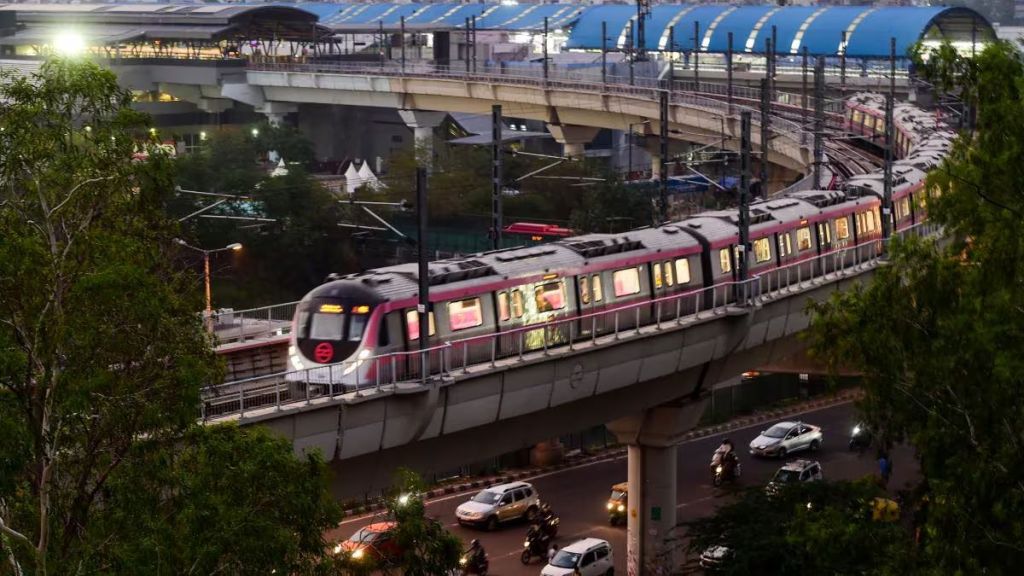The Delhi Metro Rail Corporation (DMRC) plans to integrate artificial intelligence into its Phase-4 project to enhance crowd management and train maintenance, aiming to boost efficiency, officials revealed.
In an interview with PTI, Vikas Kumar, Managing Director of DMRC, emphasised the organization’s commitment to adopting cutting-edge technology. “The metro has always kept pace with technological innovations,” Kumar noted, highlighting the transformative impact of technologies like driverless metro trains.
“The technology has been quite disruptive like it immediately changes the complete scenario and so fast the technology is evolving, we also, like driverless metro is a product of that only, and if you take this as corollary, what future it holds that is immense because driverless is one stage where you do not require crew or crew scheduling, only at the click of the button, you can start the train and it will move,” Kumar told PTI.
Delhi Metro to focus on operational efficiency and cost-effectiveness
Kumar elaborated on the flexibility planned for Phase-4, where train compositions can vary between three and six coaches to match fluctuating passenger traffic. This adaptable approach ensures operational efficiency and cost-effectiveness by right-sizing train capacity based on real-time demand patterns.
“What happens now, supposing somewhere sudden demand is there sudden rush has come even you have not planned for that earlier. With the driverless train, you can immediately induct a train. Otherwise to induct a train with driver you need to arrange for a driver first,” he added.
“At the same time, if crowd is not there, it can be optimised. The metro can have variable composition train in phase-4 project like three coach and six coach composition. The composition of trains can be changed. When there is less demand, the six coach train would be split into three coach trains,” Kumar said.
DMRC to adopt technology for crowd control
Furthermore, Kumar discussed upcoming technologies such as CCTV monitoring and facial recognition for enhanced crowd control, underscoring ongoing developments in this area.
Regarding AI’s role, Kumar informed its potential to further refine decision-making processes. By integrating AI into operations, including predictive maintenance, DMRC aims to optimise maintenance schedules and minimise operational disruptions.
“So here also the running of train is the technology you can split. But if you in fact club it with AI, like AI is sitting on top of decision making processes, then it tends to give a much more excellent and efficient decision. It is a very nascent field, so a lot of development is required and AI the more affective it is, the more data you have then only you will be able to give a better AI which will predict. So as a result of AI predictive, maintenance can also be there. We are working in that also,” Kumar said.
This proactive approach contrasts with traditional scheduled maintenance, ensuring resources are utilised more efficiently.
Delhi Metro to procure 312 coaches for Phase-4 requirements
Anuj Dayal, Principal Executive Director, highlighted DMRC’s strategy to procure 312 coaches tailored for Phase-4 requirements, compatible with driverless operations across the network’s Magenta and Pink lines.
“This will help in optimising the capacities according to requirements. All these trains will be compatible for driverless operations like the Magenta and Pink lines of the presently operational network. A total of 312 coaches are being procured as part of Delhi Metro’s Phase-4 requirements,” Dayal said.
Addressing financial aspects, Kumar acknowledged temporary losses during the COVID-19 pandemic but emphasised the organisation’s operational profitability through revenue streams like ticketing and non-fare box sources.
Dayal emphasised the importance of increasing non-fare revenues to sustain financial viability amidst operational costs and loan repayments.
(With PTI inputs)


